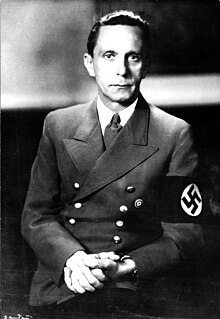Reichs Ministry of Public Enlightenment and Propaganda
| Reichsministerium für Volksaufklärung und Propaganda (German) | |
 |
|
 Propaganda Minister Joseph Goebbels |
|
| Agency overview | |
|---|---|
| Formed | March 13, 1933 |
| Dissolved | May 1, 1945 |
| Headquarters |
Ordenspalais Wilhelmplatz 8/9, Berlin-Mitte 52°30′45″N 13°23′1″E / 52.51250°N 13.38361°E |
| Employees | 2000 (1939) |
| Annual budget | 187 million ℛℳ (1941) |
| Agency executive |
|
| Child agencies | |
The Reich Ministry of Public Enlightenment and Propaganda (Reichsministerium für Volksaufklärung und Propaganda, RMVP or Propagandaministerium) was a Nazi government agency to enforce Nazi ideology.
Founded on 14 March 1933, a few months after the Nazi seizure of power by Adolf Hitler's government, it was headed by Reich Minister Joseph Goebbels. The role of the new ministry, which set up its offices in the 18th-century Ordenspalais across from the Reich Chancellery, was to centralise Nazi control of all aspects of German cultural and intellectual life. An unstated goal was to present to other nations the impression that the Nazi Party had the full and enthusiastic backing of the entire population. It was responsible for controlling the German news media, literature, visual arts, filmmaking, theatre, music, and broadcasting.
As the central office of Nazi propaganda, it comprehensively supervised and regulated the culture and mass media of Nazi Germany. A major focus of the propaganda was Hitler himself, who was glorified as a heroic and infallible leader and became the focus of a cult of personality. Much of this was spontaneous, but some was stage-managed as part of Goebbels' propaganda work. An example of the latter would be the 1934 Nuremberg Rally. Hitler was the focus and his moves were carefully choreographed. The rally was the subject of the film Triumph of the Will, one of several Nazi propaganda films directed by Leni Riefenstahl. It won the Gold Medal at the 1935 Venice Film Festival. Goebbels and his ministry were involved in both the rally and the film production.
...
Wikipedia
